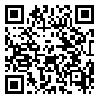Volume 19, Issue 4 (winter 2018)
JHC 2018, 19(4): 262-271 |
Back to browse issues page
Department of Health Services Management, Islamic Azad University, Tehran North Branch, Tehran, Iran
Abstract: (4407 Views)
Background & Aim: Anger is an internal stressor associated with health issues. Moral intelligence is one of the factors that can affect psychological well-being and control of anger. Therefore, the aim of this study was to determine the relationship between moral intelligence and anger among nurses in emergency units of hospitals affiliated to Kashan University of Medical Sciences.
Methods: This descriptive correlational study was done on 261 nurses working at emergency units of Kashan hospitals that selected by census sampling. Lennick and Kiel’s moral intelligence questionnaire and Perry and Bass’s anger survey were used to collect the data. Data were analyzed by descriptive statistics (mean and standard deviation) and inferential statistical methods including Spearman’s correlation coefficient and multivariable regression analysis using SPSS v.24.
Results: According to the findings of this study, the mean scores of moral intelligence and anger among participants in the study were 73.06±8.08 and 39.18±12.37, respectively. Spearman correlation test showed that there is a significant negative relationship between the moral intelligence and the anger of the participants in the study (p<0.001).
Conclusion: According to the results, the level of anger reduces among nurses as their moral intelligence increases. Considering that ethical intelligence is a type of acquired ability, the level of anger can be reduced by promoting it among nurses.
Methods: This descriptive correlational study was done on 261 nurses working at emergency units of Kashan hospitals that selected by census sampling. Lennick and Kiel’s moral intelligence questionnaire and Perry and Bass’s anger survey were used to collect the data. Data were analyzed by descriptive statistics (mean and standard deviation) and inferential statistical methods including Spearman’s correlation coefficient and multivariable regression analysis using SPSS v.24.
Results: According to the findings of this study, the mean scores of moral intelligence and anger among participants in the study were 73.06±8.08 and 39.18±12.37, respectively. Spearman correlation test showed that there is a significant negative relationship between the moral intelligence and the anger of the participants in the study (p<0.001).
Conclusion: According to the results, the level of anger reduces among nurses as their moral intelligence increases. Considering that ethical intelligence is a type of acquired ability, the level of anger can be reduced by promoting it among nurses.
Type of Study: correlation design |
Received: 2017/07/24 | Accepted: 2017/12/26 | Published: 2018/02/12
Received: 2017/07/24 | Accepted: 2017/12/26 | Published: 2018/02/12
| Rights and permissions | |
 |
This work is licensed under a Creative Commons Attribution-NonCommercial 4.0 International License. |


